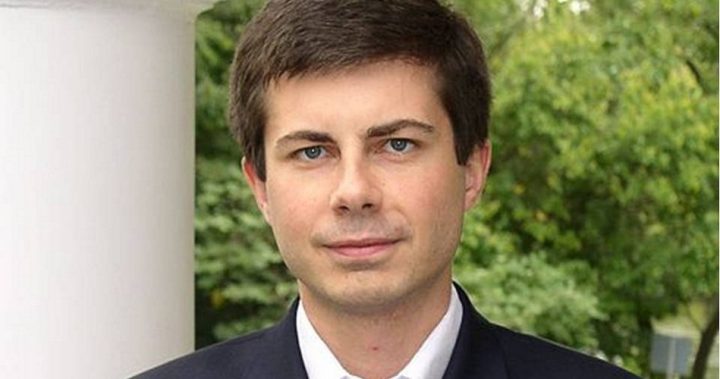
It’s the season of the parade of people with high hopes and low name recognition declaring their intent to run for the White House.
It seems as if every day there is another announcement from a member of the Democratic Party who sees himself (or herself) as the David that can take down the Goliath that is President Donald Trump.
The latest local politician to set his sights on occupying the Oval Office — Pete Buttigieg, mayor of South Bend, Indiana — has at least one distinction over the rest of the claque of predicted competitors: He’s openly homosexual.
Here’s how the Business Insider reported on Buttigieg’s “coming out” as gay and on his view of how his homosexuality affects his political aspirations:
During his run for a second term as mayor, Buttigieg came out in an essay published in the South Bend Tribune. He became the first openly-gay municipal executive in Indiana and won his reelection campaign with over 80% of the vote.
Buttigieg is married to Chasten Glezman, a teacher, and has become the first openly-gay man to run for the White House. To him, that shows that the times are changing.
In order to get to the issue of whether Buttigieg’s sexual preference should be persuasive in his pursuit of the presidency, I’ll offer the following quick comment on Business Insider’s use of the word “husband” to describe the man with whom Buttigieg cohabitates.
Marriage is a word with a meaning. In every major religion in the world, marriage is a sacrament, a union endowed with spiritual significance and performed by clergy.
In Judaism and Christianity, for example, for millennia marriage has been defined as the union of a man and a woman, with the Lord as a witness.
Jesus Christ himself sanctified this particular sacrament, commanding, “What therefore God hath joined together, let not man put asunder.” And, let’s not forget that the Lord’s first miracle was performed at a wedding ceremony.
To many, Buttigieg’s claim to be “married” to another man will disqualify him for any elective office and that is their prerogative and their right to consider any and all aspects of a candidate’s life in their pre-election process of elimination.
In this article, however, I am focused on the Founders’ recommendation for what we should look for in a president.
On or about August 31, 1787, at the Constitutional Convention in Philadelphia, a committee composed of eleven members — one from each state present at the convention on that date — began clearing up any confusion that remained in different parts of the proposed Constitution. James Madison was the representative from Virginia appointed to this committee and helped define the shape of the presidency as it would appear in the approved version of the Constitution.
It was while serving on this committee that Madison pushed through a proposal offered much earlier in the summer by James Wilson, a proposal placing the responsibility for choosing a president on a body of electors selected from among the people. Madison predicted that this organization of electors (today called the “Electoral College”) would be the best method for choosing a president; he believed that it would result in a president of remarkable virtue and qualification. The deliberations of this select body of men would be free from “cabal or corruption” and thus, their choice of chief executive would likewise be a man of highest personal integrity, not beholden to any particular party or person.
Finally, Madison argued that by filtering the election of the president through a body of electors chosen from among the several states, the president would be a man in whom “local considerations would give way to the general.” Here, then, Madison saw the opportunity of strengthening the bond connecting the states in the union by placing a person above the petty pull of sectional bias.
During the ratification process, Alexander Hamilton wrote several of the Federalist letters addressing the issue of the character and qualifications of a president.
In The Federalist, No. 68, Hamilton explained how the method chosen by him and his colleagues of electing the president was still influenced by the will of the people.
It was desirable that the sense of the people should operate in the choice of the person to whom so important a trust was to be confided. This end will be answered by committing the right of making it, not to any pre-established body, but to men chosen by the people for the special purpose, and at the particular conjuncture.
Regarding the decision to rely on such a body to make such an important decision, Hamilton wrote:
It was equally desirable, that the immediate election should be made by men most capable of analyzing the qualities adapted to the station, and acting under circumstances favourable to deliberation, and to a judicious combination of all the reasons and inducements that were proper to govern their choice. A small number of persons, selected by their fellow citizens from the general mass, will be most likely to possess the information and discernment requisite to so complicated an investigation.
It was peculiarly desirable, to afford as little opportunity as possible to tumult and disorder. This evil was not least to be dreaded in the election of a magistrate, who was to have so important an agency in the administration of government. But the precautions which have been so happily concerted in the system under consideration, promise an effectual security against this mischief.
While Madison and Hamilton represented the Federalist (nationalist) vision of a constitutionally qualified executive, theirs was not the only opinion.
Madison and Hamilton’s Anti-Federalist foes detected the foul stench of despotism in the powers granted to the president in the proposed Constitution.
A leader of the Anti-Federalists, Governor George Clinton of New York, penned a very prescient warning regarding the danger latent in the office of the presidency as defined by the Constitution.
He will be surrounded by expectants and courtiers, his power of nomination and influence on all appointments, the strong posts in each state comprised within his superintendence and garrisoned by troops under his direction, his control over the army, militia, and navy, the unrestrained power of granting pardons for treason which may be used to screen from punishment those whom he had secretly instigated to commit the crime and thereby prevent discovery of his own quiet, his duration in office for four years; these and various other principles evidently prove the truth of the position that if the president is possessed of ambition, he has power and time sufficient to ruin his country.
“Experience ought to teach you that when a man is at the head of an elective government, invested with great powers and interested in his re-election, in what circle appointments will be made, by which means an imperfect aristocracy bordering on monarchy may be established,” Clinton concluded.
If Pete Buttigieg’s homosexuality disqualifies him for office in your mind, then nothing more need to be said.
If, on the other, his sexual preference is no prerequisite to holding executive office, we strongly suggest you follow the Founders’ wisdom and warnings in choosing the person to whom should be entrusted the “energetic” powers of the president.
I’ll close with the words of Alexander Hamilton in The Federalist, No. 68 describing the ideal president. Pay particular attention to the attributes our Founders figured would be necessary for anyone trusted with executive power.
The process of election affords a moral certainty, that the office of President will never fall to the lot of any man who is not in an eminent degree endowed with the requisite qualifications. Talents for low intrigue, and the little arts of popularity, may alone suffice to elevate a man to the first honors in a single State; but it will require other talents, and a different kind of merit, to establish him in the esteem and confidence of the whole Union, or of so considerable a portion of it as would be necessary to make him a successful candidate for the distinguished office of President of the United States. It will not be too strong to say, that there will be a constant probability of seeing the station filled by characters pre-eminent for ability and virtue. And this will be thought no inconsiderable recommendation of the Constitution, by those who are able to estimate the share which the executive in every government must necessarily have in its good or ill administration. Though we cannot acquiesce in the political heresy of the poet who says: “For forms of government let fools contest That which is best administered is best,” yet we may safely pronounce, that the true test of a good government is its aptitude and tendency to produce a good administration.



